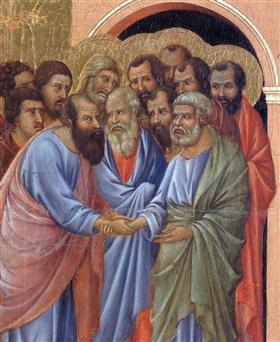 |
| Pisarro - Shepherd and Sheep |
The 4th Sunday in Easter is always
“Good Shepherd” Sunday, so called because the appointed Psalm is the 23rd
– ‘The Lord is my Shepherd’. Many churches underline the theme by choosing “shepherd” hymns, which are often metrical versions of Psalm 23, in fact. In the three years of the lectionary cycle, the Gospel passage – which is always from
John – differs slightly, but it never fails to include Jesus’ application
of the metaphor of the shepherd to himself. This year John tells us that “Jesus
used this figure of speech with them, but they did not understand what he was
saying to them”. How much harder must it be for us to understand it, since we
live in a world that – even in rural areas – is very far removed from the ancient
world where the biblical shepherd was a common sight.
Thanks to the enduring popularity of the 23rd
Psalm, the language of sheep and shepherd is still familiar and comforting to many
church people. Yet this very familiarity can prevent us from grasping its
essential feature. Sheep have a poor image in the modern world -- foolish, easily frightened, inclined to bolt -- so that shepherds have to control them, assisted often by dogs nipping at the heels of the witless sheep. Shepherds in biblical times, however, did not drive their sheep; they led them, to sources of fresh water that they were unlikely to find themselves. It was also the shepherd's job to
protect them from hazards too great for the sheep themselves. It was the
shepherd's superior wisdom and care that made this possible. Without it, the sheep could be expected to “go astray, each to his own way”
(Isaiah 56:3).
The message is not an entirely easy one for a
modern audience. We are resistant to being driven, but we are not much better disposed to being led. The contemporary spiritual climate emphasizes seeking,
searching, questing and questioning. A
spiritual 'journey' is something we undertake on our own initiative. The image of the Good Shepherd runs counter to
this. Like the shepherd, it is God who finds us, not we who find God. Our task is to be able to
recognize His call, and then to follow the divine Word as it uniquely comes to
us through Christ. Any attempt to establish a spiritual path of
our own devising will only lead to dangerous wandering.
In this year of the Lectionary, the brief passage
from Acts gives us a sense of the excitement and urgency with which the first
converts heard this call. Two thousand years on there cannot be that same
urgency. But the passage also gives us a clear indication of what has lain at
the heart of Christian practice, even from the earliest times -- “teaching, fellowship, breaking of
bread and prayers”.
Duccio -- Apostles

No comments:
Post a Comment